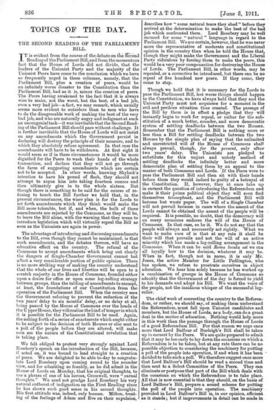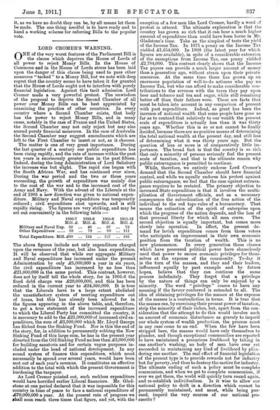TOPICS OF THE DAY.
THE SECOND READING OF THE PARLIAMENT BILL.
IT is evident from the course of the debate on &Ond Reading of the Parliament Bill, and from the momentous fact that the House of Lords did not divide, that the leaders of the Unionist Party and the majority of the Unionist Peers have come to the conclusion which we have so frequently urged in these columns, namely, that the Parliament Bill, plus a creation of peers, would be an infinitely worse disaster to the Constitution than the Parliament Bill, bad as it is, minus the creation of peers. The Peers having awakened to the fact that it is always wise to make, not the worst, but the best, of a bad job, even a very bad job—a fact, we may remark, which usually seems more evident to outsiders than to men who have to do the disagreeable work of making the best of the very bad job, and who are naturally angry and indignant at such an uncongenial task—it was inevitablethat the Second Read- ing of the Parliament Bill should pass without challenge. It is further inevitable that the House of Lords will not insist on any amendments which the Government persist in declaring will destroy the principle of their measure, and to which they absolutely refuse agreement. In that case the amendments will have to be withdrawn. At first sight it would seem as if in these circumstances it would be more dignified for the Peers to wash their hands of the whole transaction, and declare that they will not go through the farce of suggesting amendments which are certain not to be accepted. In other words, knowing Shylock's intention to have his pound of flesh, they should not attempt to argue him into taking fourteen ounces and then ultimately give in to the whole sixteen. But though there is something to be said for the course of re- fusing to touch the Bill further we hold that, in the present circumstances, the wiser plan is for the Lords to set forth amendments which they think would make the Bill more tolerable, but if, and when, the bulk of these amendments are rejected by the Commons, as they will be, to leave the Bill alone, with the warning that they mean to introduce legislation which will virtually repeal the Bill as soon as the Unionists are again in power.
The advantage of introducing and discussing amendments to the Bill, even though they cannot be maintained, is that such amendments, and the debates thereon, will have an educative effect on the country. The refusal of the Commons to accept amendments which bring out clearly the dangers of Single-Chamber Government cannot but affect a very considerable portion of public opinion. There is no more striking way of making the country understand that the whole of our lives and liberties will be open to a scratch majority in the House of Commons, founded either upon a desire for office or upon some log-rolling strategy between groups, than the tabling of amendments to exempt, at least, the foundations of our Constitution from the operation of the Parliament Bill. When the country sees the Government refusing to prevent the reduction of the two years' delay to six months' delay, or no delay at all, being passed by the House of Commons over the heads of the U pper House, they will realize thekind of temperin which it is possible for the Parliament Bill to be used. Again, the setting forth of a series of enactments which ought either to be subject to the decision of both Houses or else sent to a poll of the people before they are altered, will make men see the nature of the Constitutional revolution that is taking place.
We felt obliged to protest very strongly against Lord Rosebery's speech on the introduction of the Bill, because, if acted on, it was bound to lead straight to a creation of peers. We are delighted to be able to-day to congratu- late Lord Rosebery upon comint, round to the sounder view, and for admitting so frankly, as he did admit in the House of Lords on Monday, that his original thoughts, to use a phrase of one of his heroes, Cromwell, were " carnal thoughts." We need not grudge Lord Rosebery his very natural outburst of indignation on the First Reading since he has showu such good sense in his second thoughts. His first attitude was, indeed, only human. Milton, treat- ing of the feelings of Adam and Eve on their expulsion, describes how "some natural tears they shed" before they arrived at the determination to make the best of the bad job which confronted them. Lord Rosebery may be well excused for some " natural " language in regard to the Parliament Bill. We are certain, however, that he was never more the representative of moderate and constitutional opinion in the country than when he told the House that, though they might make the Government and the Liberal Party ridiculous by forcing them to make the peers, this would be a very poor compensation for destroying the House of Lords. The Parliament Bill, in other words, may be repealed, or a corrective be introduced, but there can be no repeal of five hundred new peers. If they come, they come to stop.
Though we bold that it- is necessary for the Lords to pass the Parliament Bill, lest worse things should happen to the Constitution, we have always held that they and the Unionist Party must not acquiesce for a moment in the evil and perilous situation thus created. The passage of the Bill by them is in effect a pledge that they • will instantly begin to work for repeal, or rather for the sub-. stitution of a much better, sounder, and more democratic system of settling deadlocks between the two Houses. Remember that the Parliament Bill is nothing more or less than a Bill for settling deadlocks between the two Houses by the simple plan of saying that the unlimited and unrestricted will of the House of Commons shall always prevail, though, for the present, only after two years' delay. The Unionists are pledged to substitute for this unjust and unholy method of settling deadlocks the infinitely better and more democratic plan of settling them by an appeal to the , master of both Commons and Lords. If the Peers were to pass the Parliament Bill and then sit with their hands before them they would indeed be guilty of a betrayal of the Constitution. If, however, they at once take up in earnest the question of introducing the Referendum and make it their prime political object they will soon find themselves triumphant, and the Parliament Bill will beeome but waste paper. The will of a Single Chamber will not prevail because in cases where the assent of the Lords cannot be obtained the assent of the people will be required. It is possible, no doubt, that the democracy will on many occasions endorse the will of the House of Commons. In that case, so be it. We do not say that the people will always and necessarily act rightly. What we want to make sure of is that at any rate it shall be their will that prevails and not the will of an active minority which has made a log-rolling arrangement in the Commons. When it can be said Boin,a loeuta est we can all loyally bow to the decision, whatever it may be. When in fact, though not in name, it is only Mr. Jones, the active Member for Little Pedlington, who has spoken, we refuse to prostrate ourselves in abject adoration. We hear him solely because he has worked up a combination of groups in the House of Commons so adroitly that the Government of the day is forced to yield to his demands and adopt his Bill. We want the voice of the people, not the insidious whisper of the successful log- roller.
The chief work of converting the country to the Referen- dum, or rather, we should say, of making them understand the Referendum, must fall upon Unionist candidates and members, but the House of Lords, as a body, can do a great deal in the matter of education. Nothing would help more in this work than the passage through the House of Lords of a good Referendum Bill. For that reason we urge once more that Lord Balfour of Burleigh's Bill shall be taken up in earnest by the Peers. We are quite prepared to admit that it may be too early to lay down the occasions on Which a Referendum is to be taken, but at any rate there can be no possible objection to considering the machinery for putting a poll of the people into operation, if and when it has been decided to take such a poll. We therefore suggest once more that Lord Balfour's Bill should be read a second time and then sent to a Select Committee of the Peers. They can eliminate or postpone that part of the Bill which deals with the occasions on which the Referendum is to. take place. All that is now essential is that they should, on the basis of Lord Balfour's Bill, prepare a sound scheme for putting the poll of the people into operation. The machinery provided in Lord Balfour's Bill is, in our opinion, efficient as it stands; but if improvements in detail can be made in it, as we have no doubt they can be, by all means let them be made. The one thing needful is to have ready and to hand a working scheme for referring Bills to the popular vote.







































 Previous page
Previous page